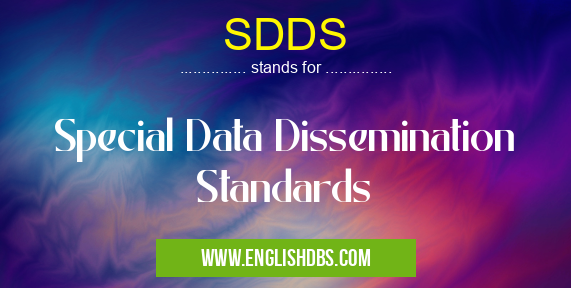What does SDDS mean in US GOVERNMENT
Special Data Dissemination Standards (SDDS) is a set of comprehensive guidelines developed by the International Monetary Fund (IMF) for data dissemination practices. SDDS were first introduced in 1996 and have since become widely accepted as an international standard for economics and finance data transparency. The approach of SDDS is to provide guidance on how countries should report various macroeconomic information and give both national authorities and international organizations insight into the financial health of economies around the world. In short, SDDS aims to make economic figures from across the globe more reliable, relevant, and accessible.

SDDS meaning in US Government in Governmental
SDDS mostly used in an acronym US Government in Category Governmental that means Special Data Dissemination Standards
Shorthand: SDDS,
Full Form: Special Data Dissemination Standards
For more information of "Special Data Dissemination Standards", see the section below.
Essential Questions and Answers on Special Data Dissemination Standards in "GOVERNMENTAL»USGOV"
What is SDDS?
The Special Data Dissemination Standard (SDDS) is a set of standards prepared by the International Monetary Fund for countries that wish to inform the public on their economic and financial data, including Gross Domestic Product (GDP). These standards are intended to ensure that governments release comprehensive, timely, transparent, and accessible data.
What are the benefits of SDDS?
SDDS enables governments to increase transparency in their economic and financial data releases, which can lead to better policy decisions and improved public understanding of economies. It also helps improve international economic cooperation and facilitates cross-country comparisons.
Who uses SDDS?
SDDS is used by numerous countries around the world, as well as international organizations such as the European Central Bank.
How often do countries publish information according to SDDS?
Countries must adhere to a predetermined schedule of releasing economic and financial statistics according to SDDS guidelines; this schedule typically includes monthly or quarterly reports.
Does SDDS address data quality issues?
Yes, SDDS has provisions in place for ensuring high-quality data. This includes using internationally recognized methods of compilation, ensuring accuracy and reliability through reconciliation with third parties where appropriate, and providing timely access to relevant supporting documentation.
Are specific IT systems required for implementing SDDS?
Yes, governments must select an appropriate IT system that can be used to store, update, process and disseminate statistical information according to its own specific requirements while adhering to the guidelines set out in the standard.
Is there any technical support available for implementing SDDS?
Yes, technical assistance is available from IMF experts who can assist with assessing a country’s current capacity for data dissemination against their future needs based on these standards. Furthermore they can provide guidance on how best to implement them.
How does a country become compliant with SDDS?
To be compliant with these standards a country must pass an assessment set out by the IMF on their current abilities in terms of following all the standards laid out by the program; however once they have successfully completed this assessment they will be officially compliant with these standards.
Does adherence to these standards require any ongoing maintenance work?
Yes yearly self-assessments need to conducted yearly against these standards in order for a county remain fully compliant with them.
Final Words:
The adoption and implementation of Special Data Dissemination Standards (SDDS) has enabled consistent transparency between governments worldwide when it comes to economic and financial information. This allows governments, international organizations, investors, businesses, researchers etc., access vital information quickly and accurately - enabling informed decisions across all aspects related to finances or economics globally. By providing a standardized system that promotes accuracy in reporting data across borders while still allowing individual countries to customize their own metrics according to their idiosyncrasies, SDDS has revolutionized the way we view global economics today.
